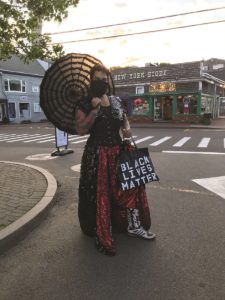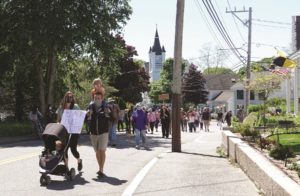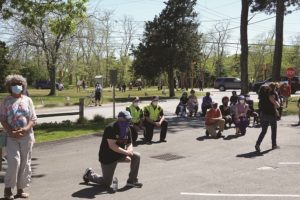WELLFLEET — Protests against police brutality following the May 25 murder of George Floyd in Minneapolis were not confined to America’s major cities. About 150 people marched through Wellfleet last Sunday afternoon, and about the same number gathered in Provincetown that evening. The protests formed, in many ways, a striking contrast to those held in Boston and other cities.

The two events were quite different. In Wellfleet, police took a dramatic supporting role. In Provincetown, the police were not invited to participate by organizer Michelle Axelson, who said, “I feel one of my privileges is that I would have the support of the police,” adding, “I wanted to put the focus elsewhere.”
Some 120 cars drove along Commercial Street from the Harbor Hotel to MacMillan Pier, where members of Racial Justice Provincetown gathered. Then the cars went on to Stop & Shop, where many people of color work, Axelson said.
Axelson, the owner of Womencraft, and her friends Myra Slotnick, Tricia Cooke, and Lisa Fithian, took the lead in Provincetown. Axelson has been helping with the ongoing noise parades to support essential workers.
The Wellfleet march was organized by three young people, Sam Giamatti, Topher Agger, and Nara Benoit Kornhauser, all from New York. Giamatti and Agger have been summering on the Cape for years. Agger’s aunt and uncle, Sharon Rule and David Agger, live year-round in town.
Wellfleet Police Chief Michael Hurley told the Independent that Giamatti contacted him late Saturday afternoon and “there was a good dialogue.” Together, they developed a plan for closing off roads and conducting a safe march, even though the protesters did not have permit.
Hurley condemned the incident that took Floyd’s life. “It’s unspeakable,” the chief said. “It never should have happened. There were three other police officers that stood by and let this happen. That’s the outrage you’re seeing from law enforcement. It’s rocked our profession.”

The protesters met at Wellfleet Town Hall and marched to the Wellfleet Police Dept., where they made it clear their grievance was not with local officers. Speaking to the crowd, Giamatti said, “The Wellfleet Police Dept. is part of the community. Not everyone is so lucky.”
The protesters were accompanied by Wellfleet officers Nick Daley and Sgt. Paul Clark. “Prior to the march,” Chief Hurley said, “two of my officers approached me and asked if they could march with the group.” During a moment of silence, the officers took a knee with protesters.
Watching the outpouring of anger all over the country in the days before the march, Giamatti said, he and Agger felt aware of being far from the tension and pain of the cities. “But we felt like that wasn’t a reason not to take a stand and show solidarity with the victims of police brutality across the country,” Giamatti said.
The Wellfleet protest was completely peaceful. Several young children were there, some wearing masks and holding small signs. All the adults wore masks, and the crowd mostly obeyed social distancing. Reporters on the scene were treated respectfully by police and protesters.

While Chief Hurley was not worried about the protest turning violent, he added, “The only thing that concerned me was where everybody is right now in terms of Covid-19. People have gone through a lot in the past few months.” He noted that extreme stress can cause people to act differently than they might normally.
Though about 150 marched, the number of black people in attendance in Wellfleet could be counted on two hands — a somewhat higher percentage than the overall representation of African Americans countywide. As of June 2013, Barnstable County Human Services reported that just 1.3 percent of the population was black.
“I’ve been living with Sam and his family for the past two weeks in Wellfleet, and I am still shocked by the absence of citizens of color,” Kornhauser wrote via text message. “This level of homogeneity is really striking, especially for someone who grew up in a large metropolitan area, and having been raised by interracial parents.
“Cape Cod,” Kornhauser concluded, “is undeniably beautiful; the scenery, the quaint seascape towns, but I’ve found that beauty equally unsettling in how pristine and white it is.”

Grappling with the same questions about the predominant whiteness in Provincetown, Axelson said she avoided asking anyone to be an official spokesperson. She said her intention was to let the white people who were present “take responsibility and not put the mantle on the black people in this community.”
When people at the pier asked to hear from people of color, Ngina Lythcott of Provincetown spoke, and then Qya Cristál, a local performer, took up the bullhorn and sang “Amazing Grace.”
While these marches may not be representative of the unrest happening elsewhere in the country, protesters remarked on the essentialness of allyship.
“Part of me feels like, what good can marching in a small town do?” Grace Emmet of Eastham said before the Wellfleet march. “But at the same time, I think it’s important that in every corner of the earth people know they are supported. I thought I’d come out and show my support for all the people who are hurting right now.”



